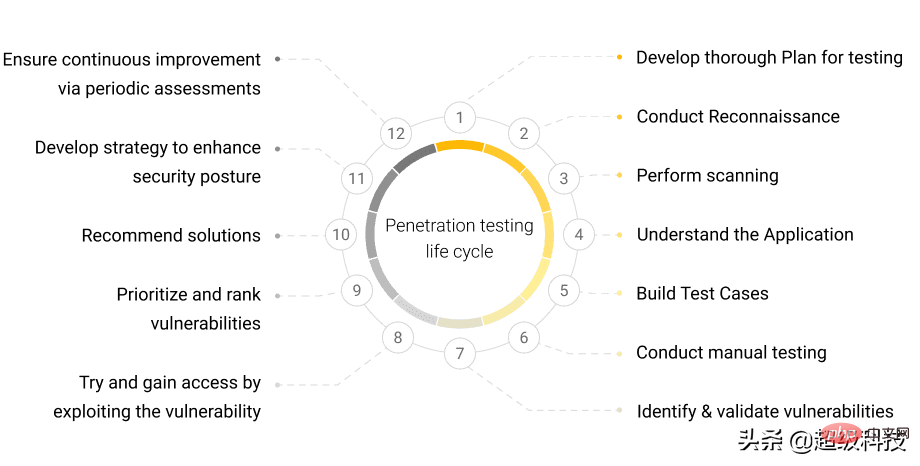Home >Technology peripherals >AI >Do you know about AI applications in enterprise network security?
Do you know about AI applications in enterprise network security?
- WBOYWBOYWBOYWBOYWBOYWBOYWBOYWBOYWBOYWBOYWBOYWBOYWBforward
- 2023-04-16 19:43:011130browse
As the pace of enterprise security system development accelerates, new and more sophisticated types of cyberattacks are emerging. According to the World Economic Forum, the protective measures companies put in place are instantly outdated. The number of attacks increased by 30% compared to the previous year, and this alarming trend continues.

The market lacks approximately 2.72 million cybersecurity professionals to deal with the growing number of threats. This is where artificial intelligence can help businesses. Let’s talk about six AI use cases in cybersecurity.
Detect malicious code and malicious activities in enterprise networks
AI automatically classifies domains by analyzing DNS traffic to identify C&C, malicious, spam, phishing and cloned domains, etc. Previously, in order to manage this environment, having a good blacklist was enough. They cope with their tasks despite regular updates and lots of them.
Nowadays, domain names are created within 1-2 minutes, used no more than 2-3 times within half an hour, and then the criminals switch to other domain names. To track them, blacklists are not enough: you need to use AI technology. Smart algorithms learn to detect these domains and block them immediately.
Encrypted Traffic Analysis
According to data from Cisco, more than 80% of Internet traffic is encrypted. It needs to be analyzed. You can apply the "Government Man in the Middle" scenario or use AI technology that can identify the following issues through metadata and network packets without encryption and decryption without analyzing the payload:
- Malicious code;
- Malware family;
- Applications used;
- Devices that work within one version or another of an encrypted TLS session or SSL framework.
These techniques are proven in practice and allow you to understand what is happening inside encrypted traffic, and their numbers are growing. And you don’t need to invest too much in it.

Detecting Fake Photos and Substituted Pictures
Algorithms identify whether someone's face in a photo has been replaced with someone else's photo. This feature is particularly useful for remote biometric authentication in financial services. It prevents scammers from creating fake photos or videos and presenting themselves as legitimate citizens who can get loans. Therefore, they don't steal other people's money.
Recognize speech, language and speech
This AI feature is used to detect information leaks and read unstructured information in a non-machine-readable format. This information enriches data from firewalls, gateways, proxy systems, and other technology solutions that provide structured data.
So you will know who accessed the Internet and when, and whether they used a corporate or departmental network. AI helps enrich this information with data from news, company newsletters, and more.
Provide recommendations
Based on statistics, AI makes recommendations on which protection tools to use or which settings need to be changed to automatically improve the security of your corporate network. For example, the Massachusetts Institute of Technology created AI2, a system that can detect unknown threats with a probability of up to 85%.
The more analysis the system performs, the more accurate the next estimate it gives due to the feedback mechanism. Furthermore, intelligent algorithms do this at a scale and speed that human defenders cannot handle.
Software Vulnerability Search Automation
A vulnerability is a bug in a program that allows someone to benefit from it (e.g., extract data for sale, transfer money, steal private data from a phone, etc.). Thanks to AI, it is already possible to automatically search for such errors.
AI finds vulnerabilities in programs and inspects application interfaces. If it detects ransomware on a computer, it immediately disconnects its users from the network, thus sparing the rest of the company from dangerous infections.
Artificial intelligence has broad prospects in the field of network security. But it must be handled appropriately like any other technology. It's not a silver bullet, and even having the most advanced technology doesn't mean 100% protection. Artificial intelligence will not protect you from serious attacks caused by ignoring basic cybersecurity rules. If a clear ecosystem has been established that can adapt to the changing enterprise network, then smart algorithms should be implemented.
The above is the detailed content of Do you know about AI applications in enterprise network security?. For more information, please follow other related articles on the PHP Chinese website!
Related articles
See more- Technology trends to watch in 2023
- How Artificial Intelligence is Bringing New Everyday Work to Data Center Teams
- Can artificial intelligence or automation solve the problem of low energy efficiency in buildings?
- OpenAI co-founder interviewed by Huang Renxun: GPT-4's reasoning capabilities have not yet reached expectations
- Microsoft's Bing surpasses Google in search traffic thanks to OpenAI technology

